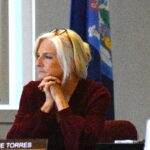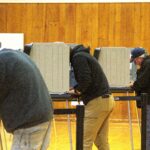By Shelby Hartin
Student intern
University of Maine
ORONO, Maine — Collaborative education efforts are under way between the University of Maine and local high schools.
Yung-Wei “Dennis” Lin, assistant professor of counselor education at UMaine, is spearheading an experimental peer mentoring program that may see significant growth in coming years. “It actually started with two local high schools that came to us and asked us to train some of their students with basic active listening skills,” Lin explained in an interview.
The two high schools, Blue Hill and Piscataquis Community, contacted UMaine in hopes that faculty members like Lin would be able to train their high school students to act as peer mentors.
“They came to my colleague and my colleague came to me and said, ‘Well, it’s an opportunity. Do you want to do it?”
Lin’s response to this question has jumpstarted a program that may soon be effective in high schools across the state of Maine, including those in Aroostook County. Katahdin High School will act as one of four Maine high schools in an experimental peer mentoring program conducted by Lin this coming fall. Two of the four high schools will be randomly chosen by Lin to pick students to become peer mentors based on a rigorous recommendation screening. According to Lin, students chosen to become peer mentors will have to meet several criteria, including an above average academic performance and no record of behavioral issues, such as aggression, cheating in school or skipping class.
“Additional criterion we really like to see is students [who have] this kind of helping experience before, maybe Girl and Boy Scouts experience or they have some kind of tutoring experience or they serve in their churches,” Lin said. “A lot of research [shows that] students with this type of experience [are] more likely to be successful in this program.”
Students chosen from these two high schools will act as an experimental group, mentoring their peers after they’ve been trained at UMaine.
“In the training students learn active listening skills and also learn what their roles should be,” Lin said.
Students will learn about confidentiality, appropriate helping relationships and topics such as learning to appreciate diversity. Training sessions are held in the John A. Lindlof Learning Center at UMaine.
“The unique thing in this peer mentoring program is students get to recall their session,” Lin explained.
Recorded sessions can be reviewed by the student as well as those training the students, enabling a beneficial system of feedback to improve their experience.
The other two high schools of the four that have been chosen will act as control groups where no training will commence until after significant data has been collected concerning the effectiveness of the mentoring program at the experimental high schools.
When asked about the possibility of proliferation of this program throughout the state, Lin seemed confident.
“The research proposal is under the university review – it’s in second review now, so I’m pretty positive it will be approved.”
After approval the program will commence and a series of data collections concerning the effectiveness of the peer mentoring will be performed.
“I’m pretty confident we should be able to find pretty good results […] then I’m going to utilize the findings we have to promote this program to some more schools.”
Lin explained that northern Maine high schools are a definite possibility for the future.
“I think a lot of schools in the northern area of Maine don’t have enough resources. They have limited teachers, limited school counselors, limited mental health professionals. […] A lot of students drop out. They don’t feel the need to stay in school and they have lower motivation, lower connection with the school.”
The point of this program is simple: Students often find it easier to talk with other students who are closer to their age.
“We pair peer mentor and peer ‘mentees’ with some kind of age difference: two years. That’s the most effective model,” Lin explained. “Ideally, we will try to do that.”
Hopes are that this program will both assist in student development and take some of the burden away from guidance counselors.
“We are not sending out students over there to provide this service […] on their own. That is a little bit too risky and we don’t want to add an extra burden to school counselors. Actually, we developed this program to take away their burden — to share their burden. So we don’t want to say, ‘OK, school guidance counselor, you get to supervise eight peer mentors. You have to meet with them every week.’ They don’t really have this kind of extra time. So instead we do this more efficient, more effective way,” Lin said.
“From the students in the two pilot schools [Blue Hill and Piscataquis] we trained already, [we received] a lot of really positive feedback. It seems easier [for] other high school students to talk with peers instead of talking with guidance counselors,” he concluded.
Hopes are high for this program. After experimental groups have been established and data has been collected, Lin intends to make this peer mentoring program a reality throughout the state of Maine.







